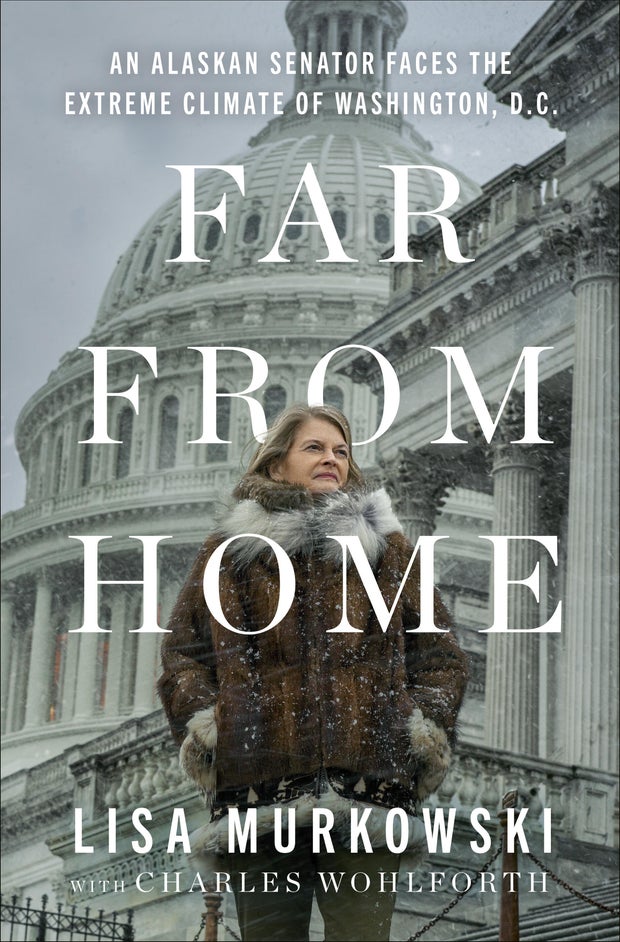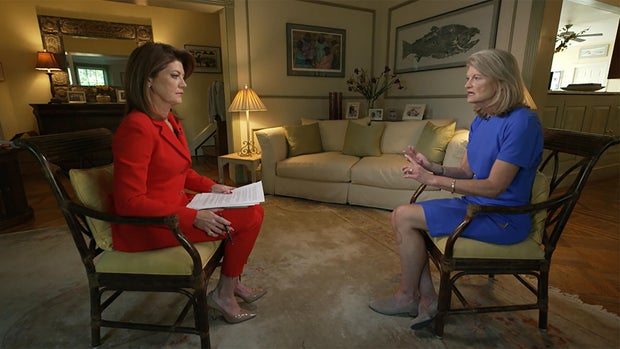Sen. Lisa Murkowski on navigating Washington under Trump

For Senator Lisa Murkowski, Alaska, the last frontier, is her favorite frontier. The third generation Alaskan is as familiar in the halls of Congress as she is on an Alaska Airlines flight (where even the flight attendants call her "Lisa") as she flies home nearly every weekend to America's northernmost state.
Each day is packed with constituent meetings. The state's senior senator says it's what keeps her connected to the needs of Alaskans, from the high cost of living and childcare, to the shortage of housing.
She writes about being a moderate in a polarized Washington in her new memoir out this week: "Far from Home: An Alaskan Senator Faces the Extreme Climate of Washington, D.C." The book jacket shows Murkowski bundled in a parka (lined with wolverine, beaver and fox) on the steps of the Capitol building. "I had brought my parka back to Washington, D.C. for the inauguration, because we knew it was going to be cold – We're gonna take a picture in the snow, wearing the parka with the Capitol," she said.

After a career as a lawyer and state legislator, Murkowski came to Washington in 2002 when her father appointed her to fill his Senate seat after he was elected Alaska's governor. She faced charges of nepotism, which Murkowski calls "accurate." She was ultimately elected to a full-term.
Each election has been a challenge, but none as difficult as in 2010, when she was primaried by the Tea Party … and lost. Then, she made the difficult decision: run a write-in campaign, with a challenging last name. "Nine letters," she said, "and it had to be spelt right. Because we weren't sure how the courts were going to interpret it, if it was 'Murkowsky' with a y at the end instead of an i, was that going to be sufficient to count?"
She won, giving Murkowski what she calls "a new freedom."
She said that winning independently of a party's backing reminded her of the idea that she had the support of her constituents to do what she thinks is morally right. "It absolutely reinforced that," Murkowski replied. "It's a daily reminder of how I was returned to the United States Senate. It was not through the help or the assistance of the Republican Party; it was through the hope and the assistance and the persistence of Alaskans all across the board."
Asked about her allegiance to the Republican Party today, Murkowski said, "I still have the same Republican values that I have long held. But my allegiance is not to the Republican Party. It's not to a party. It is to the people who returned me. And those people were Republicans and Democrats and independents and nonpartisans. So, when people back here in Washington talk about 'I need to answer to the base,' my base is so beautiful and diverse and eclectic and genuine."
Murkowski never voted for Donald Trump.
In February, following a flurry of executive orders from the White House, Murkowski warned her Republican Senate colleagues that Congress must not cede its authority over controlling government spending to the president.
"Just to put it into context and be fair, I don't think that we should cede – we, the Congressional branch – should cede ground to anybody, not to the courts, not to the executive," she said. "I think we have a role to do. We cannot, whether it is with tariffs, whether it's with spending, whether it's the role of advice-and-consent, we have a role that is prescribed Under Article I of the Constitution. We need to take that seriously.
"And I fear that what we're seeing more and more is a Republican conference in both the House and the Senate that may agree with the goals of President Trump, and so, they're good with however we get there. But we need to ask ourselves: If this was President Biden or if this were to be a President Booker, how would we respond? Because I don't think we would just sit back and say, 'It's okay that you use that.'"

I asked, "You think there would be more oversight?"
"I think there would," she replied. "If not oversight, at least feigned outrage. But we are basically saying, 'Whatever way you wanna get there is gonna be okay because we like the goal.'"
"Is that a capitulation by the U.S. Congress?"
"I think it's Congress not doing their job," Murkowski replied.
Their job right now: Deciding whether or not to pass President Trump's so-called "big beautiful bill." With a lot of concern over hot-button issues like Medicaid, Senator Murkowski will likely be a deciding vote.
Alaska relies more heavily on federal funding and programs than perhaps any other state in the country, so Murkowski knows the stakes for her constituents.
"I realize that my job, number one, is to be effective for Alaska," she said. "I have to be aware that my effectiveness is going to be tied to relationships, right? And so, how I am able to develop relationships in an administration where it is no secret that I did not support the president, and it's also no secret that the president did not support me. He actively campaigned against me in the state. But, at the end of the day, he won, I won."
READ AN EXCERPT: "Far From Home" by Lisa Murkowski
WATCH AN EXTENDED INTERVIEW: Sen. Lisa Murkowski (Video)
For more info:
Story produced by Julie Morse. Editor: Jason Schmidt.
Norah O'Donnell is CBS News' senior correspondent and a 60 Minutes contributing correspondent. O'Donnell is also the host of CBS News 24/7's "Person to Person," where she brings interviews that go beyond the headlines through thoughtful conversation. She is a multiple Emmy Award-winning journalist with nearly three decades of experience covering the biggest stories in the world and conducting impactful, news-making interviews.
Cbs News





